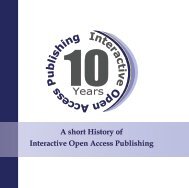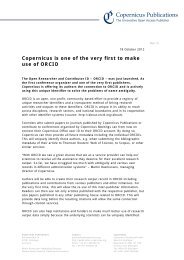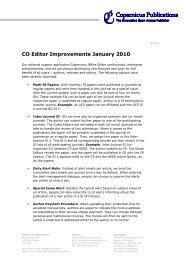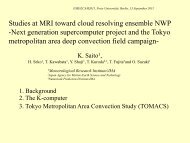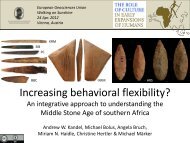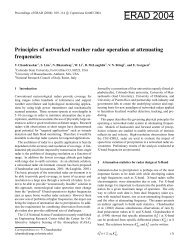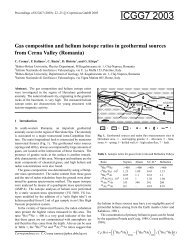Presentation - Copernicus.org
Presentation - Copernicus.org
Presentation - Copernicus.org
Create successful ePaper yourself
Turn your PDF publications into a flip-book with our unique Google optimized e-Paper software.
EuroChar – Life Cycle Assessment: Biochar<br />
Mireille Rack, Dr. Jeremy Woods<br />
EGU General Assembly 2012<br />
Vienna, Austria – 24 April 2012
<strong>Presentation</strong> Overview<br />
1) Overview EuroChar Project<br />
2) Overview WP 3: LCA<br />
• Overview LCA<br />
• WP 3 Progress<br />
• LCA – Attributional vs Consequential<br />
3) Overview WP 7: Scenario Analysis<br />
• Tasks & Questions to consider<br />
4) Summary
EuroChar Project<br />
‘Biochar for Carbon sequestration<br />
and large-scale removal of<br />
greenhouse gases from the<br />
atmosphere’<br />
January 2011 – December 2013<br />
BIOCHAR<br />
‘the carbon-rich product that remains<br />
when biomass is heated to a high<br />
temperature in reduced oxygen<br />
conditions’<br />
Tree diagram highlighting the various potential benefits of<br />
biochar from http://www.biocharinternational.<strong>org</strong>/sites/default/files/CHARTREE2.jpg
EuroChar Project – General Structure
EuroChar Project – Partners<br />
WP3 LCA<br />
WP7<br />
Scenario<br />
Analysis
WP3 – Overview: Life Cycle Assessment (LCA)<br />
“LCA addresses the environmental aspects and potential environmental<br />
impacts...throughout a product’s life cycle from raw material acquisition<br />
through production, use, end-of-life treatment...and final disposal”<br />
(ISO, 2006)<br />
Stages of LCA:<br />
1. Goal & Scope Definition<br />
2. Inventory Analysis (LCI)<br />
3. Impact Assessment (LCIA)<br />
4. Interpretation<br />
(ISO, 2006)
WP3 – LCA: Progress<br />
“LCA addresses the environmental aspects and potential environmental<br />
impacts...throughout a product’s life cycle from raw material acquisition<br />
through production, use, end-of-life treatment...and final disposal”<br />
(ISO, 2006)<br />
Stages of LCA:<br />
1. Goal & Scope Definition<br />
IN PROGRESS<br />
2. Inventory Analysis (LCI)<br />
IN PROGRESS<br />
3. Impact Assessment (LCIA)<br />
4. Interpretation<br />
Step 1: Characterization of the<br />
supply chain<br />
-feedstock: cultivation,<br />
processing/treatment,<br />
transportation<br />
-conversion technologies:<br />
TC, HTC<br />
-application of biochar: method<br />
and form<br />
-etc…
WP3 – LCA: Progress – HTC supply chain<br />
DRAFT<br />
Supply Chain - REFERENCE<br />
Leaves (~ Sept. - March)<br />
Green cuts (~ April – Aug.)<br />
T = transport
WP3 – LCA: Progress – HTC supply chain<br />
DRAFT<br />
Supply Chain - HTC<br />
Leaves (~ Sept. - March)<br />
Green cuts (~ April – Aug.)<br />
WWTP = waste water<br />
treatment plant
Mass<br />
allocation<br />
Energy<br />
allocation<br />
WP3 – LCA: Progress – GHG calculations<br />
TC – Wheat straw<br />
Straw<br />
Production<br />
315.51<br />
384.18<br />
Total emissions (CO 2e kg) per tonne of straw<br />
Harvest &<br />
Bailing<br />
3.82<br />
Pelletization<br />
1.2<br />
DRAFT*<br />
TC<br />
35.15<br />
*Calculations are based on literature figures, primary data and multiple assumptions/omissions
WP3 – LCA: Attributional vs Consequential<br />
(Tarka-Sanchez et al., 2012)
WP7 – Scenario Analysis: Task & Questions to consider<br />
Task 1 (Imperial College London)<br />
Evaluate impacts of putting biochar on land, in terms of gross and net<br />
greenhouse gas emissions and carbon sequestration potential
Biochar<br />
Diagram from Woolf et. al., 2010
Summary<br />
Overall aim:<br />
• To understand the<br />
Next Steps<br />
WP3 LCA:<br />
o overall C-cycle<br />
o overall impacts<br />
o policy requirements<br />
Continue & finalize<br />
Goal & Scope Phase of LCA<br />
Start<br />
Life Cycle Inventory (LCI)<br />
to develop modules and set up supply chains in SimaPro<br />
WP7 Scenario Analysis:<br />
Collect information from project partners on different aspects/questions
Thank you!<br />
Imperial College London<br />
Centre for Environmental Policy<br />
www.imperial.ac.uk/environmentalpolicy<br />
Mireille Rack<br />
mireille.rack@imperial.ac.uk<br />
Dr. Jeremy Woods<br />
jeremy.woods@imperial.ac.uk<br />
EuroChar Websites:<br />
http://www.eurochar.<strong>org</strong>/<br />
http://cordis.europa.eu/projects/rcn/97271_en.html
References<br />
ISO. (2006) Environmental Management – Life Cycle Assessment – Principles and Framework. BSI. Report<br />
number: BS EN ISO 14040:2006.<br />
Tarka Sanchez, S., Woods, J., Akhurst, M., Brander, M., O‘Hare, M., Dawson, T. P., Edwards, R., Liska, A.J. &<br />
Malpas, R. (2012) Accounting for indirect land-use change in the life cycle assessment of biofuel supply chains.<br />
Journal of the Royal Society Interface, 9, 1105-1119.<br />
Woolf, D., Amonette, J.E., Street-perrott, F.A., Lehmann, J. & Joseph, S. (2010) Sustainable biochar to mitigate<br />
global climate change. Nature Communications, 1, 56.



